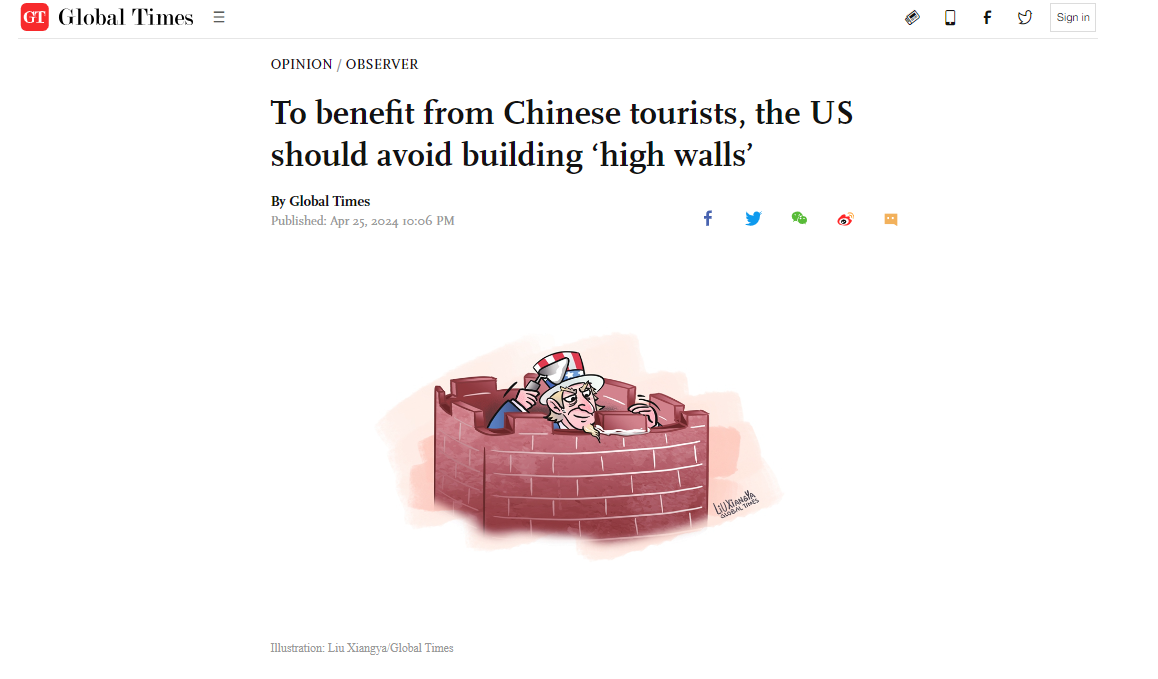LATEST INSIGHTS
Your Present Location: LATEST INSIGHTSWang Yiwei: To benefit from Chinese tourists, the US should avoid building ‘high walls’
Source: Global Times Published: 2024-04-25

The US has built 'high walls' for itself, yet envies the world outside those walls.
According to a latest survey cited by Bloomberg on Wednesday, Chinese tourists' willingness to travel abroad this year is significantly higher than in 2023, which Bloomberg says is a sign that 'Chinese tourists are again embracing international travel.'
However, compared to other major tourist destinations, the performance of the US is relatively dim. Bloomberg reported that 'the US travel industry is in for a longer wait than other major tourist destinations when it comes to reaping rewards from Chinese travel.'
Such words subtly reveal the envy and 'sour grapes mentality' of the American media. It may seem as if Chinese tourists are not choosing the US, but in reality, the US has built 'high walls' and harmed itself.
The return of Chinese tourists after the pandemic is inevitable. It is the result of China's proactive efforts. This year, in order to promote outbound tourism, China has continued to expand visa-free policies and implement corresponding measures to insist on its determination to have friendly exchanges with other countries. The popularity of destinations like Singapore, Malaysia, and Thailand among Chinese tourists is also due to their active efforts to reach visa-free policy with China, leading to a 'tourism boom.'
While the world is welcoming the return of Chinese tourists, what has the US done?
The US State Department in July 2023 urged American citizens to 'reconsider travel due to the arbitrary enforcement of local laws, including in relation to exit bans, and the risk of wrongful detentions.' In March 2024, there were incidents of Chinese students being detained in 'small black rooms' at US airports. Moreover, US Secretary of State Antony Blinken, who is currently visiting China, accused China of implementing 'genocide' in its Xinjiang Uygur Autonomous Region when responding to the 2023 Country Reports on Human Rights Practices released by the US recently. And the US is forming alliances with countries around China and targeting China on issues such as the South China Sea disputes and the Taiwan question.
The US envy or loss shown in the Bloomberg article actually points out the current problem in the US: the 'high walls' built by the US have actually trapped itself. Under repeated pressure from the US, the trust of the Chinese people in the US has reached a low point.
'The US government has not really considered people-to-people exchanges as a very essential part of US-China relations,' Wang Yiwei, a professor at the School of International Relations at Renmin University of China, told the Global Times.
The image of being free and open that the US once set for itself has now become aggressive, radical, and hysterical. 'The US was once very desirable for Chinese tourists, but it is not the case anymore,' Sun Xihui, an associate research fellow with the National Institute of International Strategy at the Chinese Academy of Social Sciences, told the Global Times. Now, Chinese people's perception of the US has fundamentally changed, Sun added.
Recently, US Deputy Secretary of State Kurt Campbell said the US is considering easing advisories against its citizens traveling to China, acknowledging concerns that the warnings may have curtailed exchanges between Americans and Chinese people.
But this is far from enough. What the US really should reflect on is its policy and attitude toward China. It needs to improve its negative image in the eyes of the Chinese people and stop poisoning the environment for better China-US relations, and create an atmosphere conducive to people-to-people exchanges between China and the US.
If the US wants to take a global share of the benefit brought about by Chinese tourists, it needs to make changes first.
Key Words: Wang Yiwei, China-US Relations























































































 京公网安备 11010802037854号
京公网安备 11010802037854号





